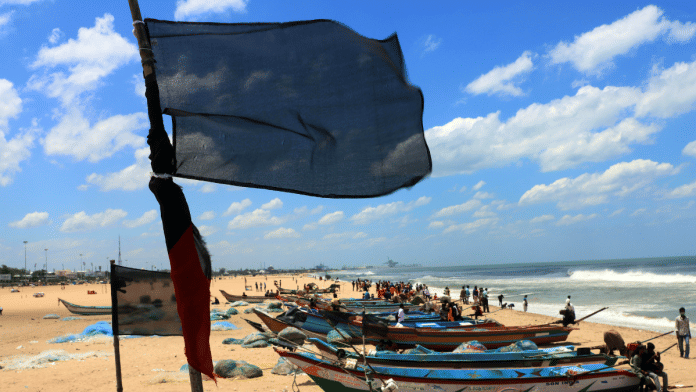Chennai: The Sri Lankan authorities arrested nearly 500 Tamil Nadu fishermen and 65 boats this year for crossing the maritime border, an Indian diplomat posted in the neighbouring country confirmed to ThePrint.
The number is more than twice compared to the previou years when 240 were apprehended in 2023.
“There have been more arrests this year simply because the violations were high,” the diplomat said.
While 350 fishermen have been released and repatriated to India, others are serving sentences or are in judicial remand of 14 days. According to the data provided to ThePrint, the Sri Lankan authorities arrested 268 fishermen in 2022 and 159 people the previous year.
The spike in arrests also comes amid Sri Lanka’s ruling Left coalition’s firm stand to curb Indian fishermen “illegally” fishing in Lankan waters. Anura Kumara Dissanayake of National People’s Power (NPP) , who was elected the crisis-struck nation’s new president in September, had assured that his administration would protect the rights of Sri Lankan fishermen.
In his first public address after assuming power, Dissanayake on Sunday accused the Indian fishermen of destroying the marine resources belonging to the Tamil-populated northern region of Sri Lanka. The NPP had won a landslide victory in the parliamentary polls, winning most votes in the northern regions, including Jaffna populated by the minority Tamil community.
On the same day, the Sri Lankan Navy arrested 23 fishermen from Nagapattinam for trespassing in Palk Bay, the stretch of ocean between the island country and Tamil Nadu, followed by the arrest of 12 fishermen on Monday.
“Indian boats are massive compared to traditional fishing methods employed by the Lankan fishermen. The trawlers used by the fishermen of India can even capture the nets of Lankan fishermen,” the diplomat said, adding that Indian fishermen engaged in bottom trawling.
The issue would have been less severe, this diplomat said, had the Indian fishermen used traditional fishing methods.
While it is widely used in Indian waters, Sri Lanka has banned bottom trawling for environmental reasons. Heavy weighted nets are dragged across the sea floor, but they harm reefs and seagrass as well as trap unwanted fishes.
The diplomat said that the increasing number of arrests has nothing to do with the administration change, adding that the Sri Lankan government and the Indian High Commission made sure that the arrested men were getting immediate necessities including change of clothes, food and other amenities.
Last Tuesday, scores of fishermen from Rameswaram, a coastal town in Tamil Nadu’s Ramanathapuram, held a protest in the Pamban island, demanding immediate action from the State and Central government.
In his second appeal since October, Tamil Nadu Chief Minister M.K. Stalin on 12 November wrote to External Affairs S. Jaishankar requesting the Union government’s intervention to secure the release of apprehended fishermen and boats. The chief minister said the arrests “not only disrupt their livelihoods but also cause immense distress to their families”.
“They (Sri Lankan authorities) used to arrest fishermen, but they will be released in a month or two. But recently they started snatching our boats too that are not being released,” 52-year-old Emarit, a fisherman from Rameswaram, told ThePrint.
He further sought the intervention of state and central governments for a permanent solution to avoid such arrests.
Tamil Nadu Fisheries and Fishermen Welfare minister Anitha R. Radhakrishnan didn’t answer ThePrint’s calls and messages regarding the arrested fishermen. This report will be updated as and when a response is received.
(Edited by Tony Rai)
Also Read: Rameswaram’s fisherfolk furious with Katchatheevu politics. ‘Don’t want island, just fishing rights’







Good job. Kudos to the Sri Lankan authorities. They must intensify their patrolling and apprehend every single Tamil fisherman who illegally fishes in Sri Lankan waters.